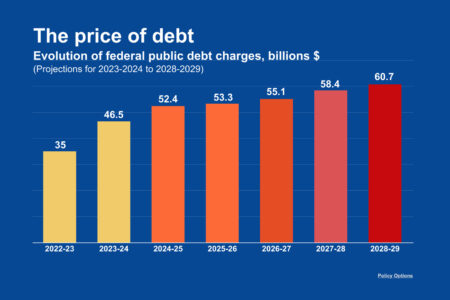
The federal government has proposed to change Canada’s tax rules so that a small business owner will no longer be able to avoid paying personal income tax on “passive” investment income, that is, income that is sheltered inside her business. As it stands, self-employed Canadians who bill their customers through a corporation are entitled to pay the small business tax rate on the corporation’s income; keep some or all of their earnings in the corporation; make investments that have no connection to the business through the corporation; keep any resulting investment income inside the corporation; and disburse that money to themselves in the form of dividends. The effect is to defer taxation — and to avoid the top personal tax rate — on high incomes.
The Liberals call this an unfair tax loophole. By all accounts, they plan to close it. The government says it is necessary to do this to achieve “fairness.” It is unfair, it is argued, that the richest Canadians have access to a tax-avoidance technique that is out of reach of most taxpayers.
Politically, this reasoning is compelling. As a question purely of tax policy, it seems difficult to dispute. But as a practical matter, the fairness argument is tougher to sustain in one particular set of circumstances: where the owner of the small business is a doctor.
Before I go further, let me offer three disclaimers.
First, I am son and brother to two surgeons and a physician. I have heard at length from my immediate family about the medical profession’s qualms with the Liberal plan. That said, I was also once a Liberal staffer, so any biases I carry may well be a wash.
Second, I am not an expert in tax policy or health care policy. I am, however, an appellate litigator. I would submit that comparing proposed outcomes against the justifications provided for them is in my wheelhouse.
Third, and finally, I do not propose to defend “income sprinkling.” Under the current rules, small business owners may attribute income to family members with lower incomes to avoid paying higher personal taxes. The government has proposed eliminating this possibility. It is tough to argue that this would not make our tax system fairer, for doctors as much as for anyone else. All doctors who incorporate may defer and avoid tax on their passive investment income. Not all doctors who incorporate can sprinkle their income among their spouses and children — those who lack spouses or children, for instance.
It’s important to distinguish self-employed doctors from other small business owners to whom the proposed tax increases would apply.
Doctors work in the public health care system. They bill a provincial or territorial government for the services they provide. The market does not decide how much they make per patient examined or per procedure performed; our governments do this. And they are contractors, not employees, thus they are in a position to incorporate as small businesses. Our health care systems function on the assumption that they will operate this way.
If the justification for the tabled tax hike is fairness, then the context of Canada’s health care system is important. Fairness may not demand one policy change that affects every small business; it may require particular treatment for one particular category of small businesses, on account of their particular circumstances.
I am not about to attempt a robust definition of “fairness,” but what I think the Liberals mean when they use the term is that people who are in similar circumstances should be treated similarly; i.e., all else being equal, the wealthiest taxpayers should not have access to tax-avoidance tools to which the vast majority of us do not. But if all else is not, in fact, equal — if a subset of the wealthiest taxpayers does business under different circumstances than the rest — then a policy that is formally equal may not actually be fair.
Let’s consider the circumstances surrounding doctors’ incomes.
A self-employed doctor’s take-home pay depends on three variables. The first and most significant is how much the provincial or territorial government agrees to pay her for each service she bills. The second is how many services she actually provides, a function of how busy she keeps her practice. The third is how her earnings are taxed. Governments — federal and provincial or territorial — control the first and the third of these three factors. Unlike other small business owners, who ultimately can decide how much to charge their customers or clients, self-employed doctors are entitled to demand only what we citizens, through our elected representatives, agree to pay them.
That is how it has been since Tommy Douglas first brought Medicare to Saskatchewan. Self-employed doctors in Canada do not work for our governments, but our governments decide what they are paid. If an individual physician wants to earn more, she has to work more — an incentive structure that serves the rest of us just fine. I suspect that patients on waiting lists would not welcome a shift toward paying clinicians based on a 9 to 5 work day, rather than on the number of patients they see. Nor do we seem to mind that doctors have to complete many years of expensive education and specialized training before we let them practice on their own. And provincial and territorial governments seem quite content not to increase their health care budgets to provide doctors with the same paid vacation time, sick days, and pensions that public servants like nurses and police officers receive.
This is where the small business tax rules come in. Because the federal tax code allows self-employed doctors to avoid the top personal income tax rate when they save for retirement or time off, provincial and territorial governments can avoid either providing those same doctors with the benefits that civil servants receive or paying doctors higher fees in lieu of the same. In recent rounds of negotiations, provincial governments have expressly encouraged doctors to incorporate at the federal government’s expense, rather than demand a larger share of provincial budgets. Doctors have taken that deal, which helps to explain why two-thirds of them are now reportedly self-incorporated.
Providing these doctors with a tax-sheltered savings vehicle purposefully offsets some of the disadvantages that we, as a country, impose on them so that we can enjoy public health care. The tax rules we impose on self-employed doctors are part and parcel of the same federal-provincial-territorial policy mix.
Is this the optimal way to compensate doctors? Of course not. But is it unfair? Not in my view. Assuming that our provincial and territorial governments continue to run our single-payer health care systems the way they have for half a century, and given that the provinces and territories are not itching to raise doctors’ fees or provide them with civil-service-style pensions and benefits, removing self-employed doctors’ ability to defer tax on passive investment income held in a corporation effectively means paying them less. A tax increase that is defended in the name of fairness would, for this particular category of small business owners, be unfair. That is, unless doctors are presently overcompensated — an argument that the government and its supporters have so far declined to make.
Ultimately, however, the difficulty of the government’s fairness rationale is exceeded by the difficulty of doctors’ bargaining position. Good luck convincing most Canadians to feel sorry for affluent professionals. The Liberals can camouflage a shift toward reduced compensation for doctors as a shift toward greater fairness, knowing full well that any doctors who dare to stand in their way risk inviting public resentment at how well they are paid.
It’s a shrewd move, to be sure, if not a cynical one. But fair it is not.
Photo: Shutterstock, by Syda Productions.
Do you have something to say about the article you just read? Be part of the Policy Options discussion, and send in your own submission. Here is a link on how to do it. | Souhaitez-vous réagir à cet article ? Joignez-vous aux débats d’Options politiques et soumettez-nous votre texte en suivant ces directives.









